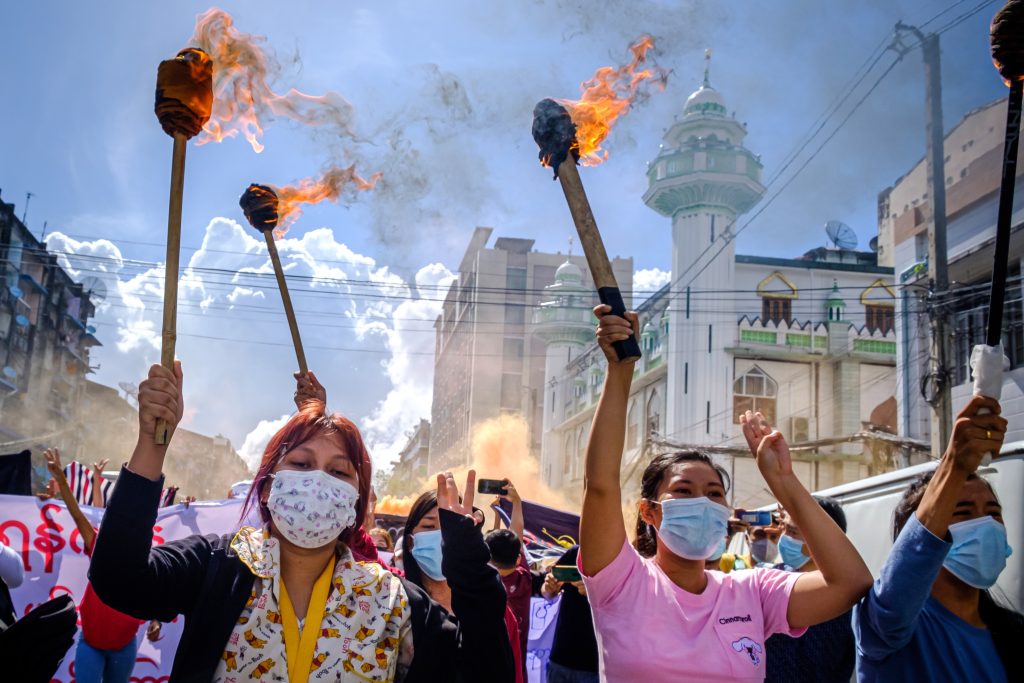The Catholic archbishop of Mandalay in Myanmar told people displaced by the conflict brought about by the military takeover of the government on Feb. 1, 2021, not to lose hope amid the challenges.
“I feel so sad to see that they flee from their houses and cannot stay at their home as other people do,” said Archbishop Marco Tin Win of Mandalay days ahead of the anniversary of the coup.
“I sympathize with them,” he said in a report posted on the website of Radio Veritas Asia, as he urged the people to “have faith in God and rely on Him.”
The prelate said he was able to celebrate Mass with displaced Catholics early in January. “It was meaningful to celebrate Mass with them for peace,” he said.
“I encouraged them with the Biblical passage and read out the [Catholic Bishops’ Conference’s] statement for them,” said Archbishop Tin Win.
“I told them that the Church is saddened, and I am here to be in solidarity with you in times of trouble and suffering,” he said.
He urged the faithful “not to lose hope and faith as long as they are alive.”
The United Nations last week called on countries around the world to ramp up pressure on Myanmar’s junta to cease violence against the country’s own people and quickly restore civilian rule.
One year on since the military seized power, UN human rights chief Michelle Bachelet said the country’s people had paid a high price in terms of lives and freedoms lost.
Bachelet said that while there had been near-universal condemnation of the coup and the ensuing violence, she branded the international response as “ineffectual,” saying it “lacks a sense of urgency commensurate to the magnitude of the crisis”.
“It is time for an urgent, renewed effort to restore human rights and democracy in Myanmar and ensure that perpetrators of systemic human rights violations and abuses are held to account,” she said.
She said the UN Security Council and the Association of Southeast Asian Nations had not done enough to convince the junta to facilitate humanitarian access.


Bachelet said she had spoken with civil liberties defenders in Myanmar who were pleading with the international community not to abandon them.
“I urge governments — in the region and beyond — as well as businesses, to listen to this plea,” the UN High Commissioner for Human Rights said.
Myanmar’s military seized power on February 1 last year, ousting the civilian government and arresting its de facto leader, Aung San Suu Kyi.
The junta has waged a bloody crackdown on dissent.
The UN Human Rights Office said that since the coup, at least 1,500 people had been killed by the military in a brutal effort to crush dissent, while thousands more would have been killed in the wider armed conflict and violence.
At least 11,787 people have been arbitrarily detained for voicing their opposition to the military, the office said, of whom 8,792 remain in custody.
At least 290 have died in detention, many likely due to the use of torture, it added.
Bachelet said the current crisis was built upon the impunity with which the military leadership waged a campaign of violence against the Rohingya minority four years ago.
“As long as impunity prevails, stability in Myanmar will be a fiction. Accountability of the military remains crucial to any solution going forward — the people overwhelmingly demand this,” she said.
Bachelet’s office is due to publish a report in March detailing the human rights situation in Myanmar since the coup. – with a report from Agence France Presse


